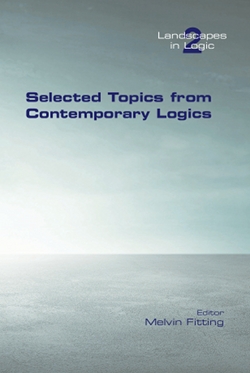 | Selected Topics from Contemporary Logics
Melvin Fitting, editor
As used by professional logicians today, is the name of their chosen subject singular or plural, “logic” or “logics”? This is a special case of a more general question. For instance, an algebraist might write a book entitled “Algebra”, which is about algebras. Though many mathematicians are not aware of it, logic today most decidedly has its plural aspect. Indeed, it always did. Classical logic, which mathematicians often tend to identify with the entirety of logic, was in place roughly by the beginning of the twentieth century. Since then a wide range of so-called non-classical logics have been developed. But indeed, before the creation of classical logic, there were multiple versions of logic, some of them more-or-less formalized. The current growing interest in medieval and ancient European and Asian logics has brought much of this back to modern awareness. Perhaps a later volume in this series will look at the history from a contemporary viewpoint. But that is not our task here.
This is the second volume in a series called Landscapes in Logic. The intention of the series is to present reports illustrating the interplay between contemporary work in logic and mainstream mathematics. Of course this is both vague and overly ambitious, and must result in heterogeneous collections. The first volume in the series, Contemporary Logic and Computing, appeared in 2020. The contents divided plausibly into topics from contemporary logic, and from contemporary computing. The present volume is more diverse, and includes articles about both classical and non-classical logics, sometimes from the semantic side and sometimes from the proof-theoretic side. Some articles are primarily technical, often algebraic, while others are more philosophical in nature. Many fit into multiple categories. This multiplicity should not be seen as a defect. The papers here do not just explore logics house by house, but say something about their general neighborhoods as well.
See inside
6 October 2021
978-1-84890-350-0
|

